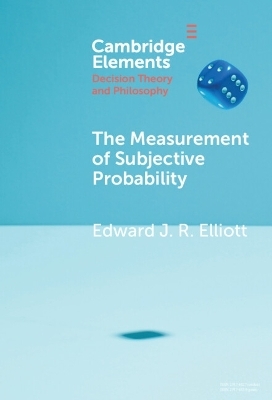
The Measurement of Subjective Probability
Seiten
2024
Cambridge University Press (Verlag)
978-1-009-48696-5 (ISBN)
Cambridge University Press (Verlag)
978-1-009-48696-5 (ISBN)
This Element discusses the main approaches to the measurement of belief. Epistemic approaches explain the measurement of belief by appeal to relations between belief states themselves, whereas decision-theoretic approaches appeal to relations between beliefs and desires in the production of choice and preference.
Beliefs come in degrees, and we often represent those degrees with numbers. We might say, for example, that we are 90% confident in the truth of some scientific hypothesis, or only 30% confident in the success of some risky endeavour. But what do these numbers mean? What, in other words, is the underlying psychological reality to which the numbers correspond? And what constitutes a meaningful difference between numerically distinct representations of belief? In this Element, we discuss the main approaches to the measurement of belief. These fall into two broad categories-epistemic and decision-theoretic-with divergent foundations in the theory of measurement. Epistemic approaches explain the measurement of belief by appeal to relations between belief states themselves, whereas decision-theoretic approaches appeal to relations between beliefs and desires in the production of choice and preferences.
Beliefs come in degrees, and we often represent those degrees with numbers. We might say, for example, that we are 90% confident in the truth of some scientific hypothesis, or only 30% confident in the success of some risky endeavour. But what do these numbers mean? What, in other words, is the underlying psychological reality to which the numbers correspond? And what constitutes a meaningful difference between numerically distinct representations of belief? In this Element, we discuss the main approaches to the measurement of belief. These fall into two broad categories-epistemic and decision-theoretic-with divergent foundations in the theory of measurement. Epistemic approaches explain the measurement of belief by appeal to relations between belief states themselves, whereas decision-theoretic approaches appeal to relations between beliefs and desires in the production of choice and preferences.
1. Introduction; 2. Representation and measurement; 3. Clarifications and desiderata; 4. Epistemic approaches: comparative confidence; 5. Epistemic approaches: alternatives; 6. Decision-theoretic approaches; Bibliography.
| Erscheinungsdatum | 20.04.2024 |
|---|---|
| Reihe/Serie | Elements in Decision Theory and Philosophy |
| Zusatzinfo | Worked examples or Exercises |
| Verlagsort | Cambridge |
| Sprache | englisch |
| Themenwelt | Geisteswissenschaften ► Philosophie ► Logik |
| Mathematik / Informatik ► Mathematik ► Wahrscheinlichkeit / Kombinatorik | |
| Wirtschaft ► Betriebswirtschaft / Management ► Allgemeines / Lexika | |
| ISBN-10 | 1-009-48696-9 / 1009486969 |
| ISBN-13 | 978-1-009-48696-5 / 9781009486965 |
| Zustand | Neuware |
| Haben Sie eine Frage zum Produkt? |
Mehr entdecken
aus dem Bereich
aus dem Bereich
ein Gegenentwurf zum kurzfristigen Denken : so werden wir zu den …
Buch | Hardcover (2023)
REDLINE (Verlag)
CHF 27,90


